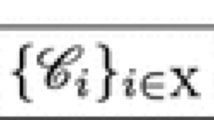Abstract
The notion of equality between two observables will play many important roles in foundations of quantum theory. However, the standard probabilistic interpretation based on the conventional Born formula does not give the probability of equality between two arbitrary observables, since the Born formula gives the probability distribution only for a commuting family of observables. In this paper, quantum set theory developed by Takeuti and the present author is used to systematically extend the standard probabilistic interpretation of quantum theory to define the probability of equality between two arbitrary observables in an arbitrary state. We apply this new interpretation to quantum measurement theory, and establish a logical basis for the difference between simultaneous measurability and simultaneous determinateness.
Similar content being viewed by others
References
Bell, J. L., Boolean-valued models and independence proofs in set theory, 2nd ed., Oxford UP, Oxford, 1985.
Birkhoff, G. and von Neumann, J., The logic of quantum mechanics, Ann. Math. 37, pp. 823–843, 1936.
Bruns G. and Kalmbach, G., “Some remarks on free orthomodular lattices,” Proc. Lattice Theory Conf., Houston, U.S.A., (Schmidt, J. ed.), pp. 397–408, 1973.
Chevalier G.: “Commutators and decompositions of orthomodular lattices,”. Order 6, 181–194 (1989)
Cohen P. J.: “The independence of the continuum hypothesis I,”. Proc. Nat. Acad. Sci. U.S.A. 50, 1143–1148 (1963)
Cohen, P. J., Set theory and the continuum hypothesis, Benjamin, New York, 1966.
Davies, E. B., Quantum theory of open systems, Academic, London, 1976.
Gibbins, P., Particles and paradoxes: The limits of quantum logic, Cambridge UP, Cambridge, UK, 1987.
Halmos, P. R., Introduction to Hilbert space and the theory of spectral multiplicity, Chelsea, New York, 1951.
Halvorson H., Clifton R.: “Maximal beable subalgebras of quantum mechanical observables,”. Int. J. Theor. Phys. 38, 2441–2484 (1999)
Holland, Jr., S. S., “Orthomodularity in infinite dimensions; A theorem of M. Solèr,” Bull. Amer. Math. Soc. 32, pp. 205–234, 1995.
Kalmbach, G., Orthomodular lattices, Academic, London, 1983.
Kochen S., Specker E. P.: “The problem of hidden variables in quantum mechanics,”. J. Math. Mech. 17, 59–87 (1967)
Marsden E. L.: “The commutator and solvability in a generalized orthomodular lattice,”. Pacific J. Math. 33, 357–361 (1970)
Okamura, K. and Ozawa, M., “Measurement theory in local quantum physics,” J. Math. Phys. 57, pp. 015209/1–015209/29, 2016.
Ozawa M.: “Boolean valued analysis and type I \({{\rm AW}^*}\)-algebras,”. Proc. Japan Acad. A 59, 368–371 (1983)
Ozawa M.: “Boolean valued interpretation of Hilbert space theory,”. J. Math. Soc. Japan 35, 609–627 (1983)
Ozawa M.: “A classification of type I \({{\rm AW}^*}\)-algebras and Boolean valued analysis,”. J. Math. Soc. Japan 36, 589–608 (1984)
Ozawa M.: “Quantum measuring processes of continuous observables,”. J. Math. Phys. 25, 79–87 (1984)
Ozawa M.: “Nonuniqueness of the cardinality attached to homogeneous \({{\rm AW}^*}\)-algebras,”. Proc. Amer. Math. Soc. 93, 681–684 (1985)
Ozawa M.: “Uncertainty relations for noise and disturbance in generalized quantum measurements,”. Ann. Physics 311, 350–416 (2004)
Ozawa M.: “Quantum perfect correlations,”. Ann. Physics 321, 744–769 (2006)
Ozawa M.: “Transfer principle in quantum set theory,”. J. Symbolic Logic 72, 625–648 (2007)
Ozawa M.: “Quantum reality and measurement: A quantum logical approach,”. Found. Phys. 41, 592–607 (2011)
Ozawa, M., “Universal uncertainty principle, simultaneous measurability, and weak values,” AIP Conf. Proc. 1363, pp. 53–62, 2011. arXiv:1106.5083 [quant-ph].
Ozawa, M., “Quantum set theory extending the standard probabilistic interpretation of quantum theory (extended abstract),” Electronic Proc. in Theoretical Computer Science (EPTCS) 172, pp. 15–26, 2014. arXiv:1412.8540 [quant-ph].
Pulmannová S.: “Commutators in orthomodular lattices,”. Demonstratio Math. 18, 187–208 (1985)
Redhead, M., Incompleteness, nonlocality, and realism: A prolegomenon to the philosophy of quantum mechanics, Oxford UP, Oxford, 1987.
Scott, D. and Solovay, R., “Boolean-valued models for set theory,” unpublished manuscript for Proc. AMS Summer Institute on Set Theory, Los Angeles: Univ. Cal., 1967.
Takeuti, G., Two applications of logic to mathematics, Princeton UP, Princeton, 1978.
Takeuti, G., “Quantum set theory,” Current Issues in Quantum Logic (Beltrametti, E. G. and van Fraassen, B. C., eds.), Plenum, New York, pp. 303–322, 1981.
Takeuti G.: “\({{\rm C}^*}\)-Algebras and Boolean valued analysis,”. Japan. J. Math. 9, 207–245 (1983)
Takeuti G.: “Von Neumann algebras and Boolean valued analysis,”. J. Math. Soc. Japan 35, 1–21 (1983)
Varadarajan, V. S., Geometry of quantum theory, Springer, New York, 1985.
von Neumann, J., Mathematical foundations of quantum mechanics, Princeton UP, Princeton, NJ, 1955, [Originally published: Mathematische Grundlagen der Quantenmechanik (Springer, Berlin, 1932)].
Author information
Authors and Affiliations
Corresponding author
Additional information
An extended abstract of this paper was presented in the 11th International Workshop on Quantum Physics and Logic (QPL 2014), Kyoto University, June 4–6, 2014 and appeared as Ref. 26).
About this article
Cite this article
Ozawa, M. Quantum Set Theory Extending the Standard Probabilistic Interpretation of Quantum Theory. New Gener. Comput. 34, 125–152 (2016). https://doi.org/10.1007/s00354-016-0205-2
Received:
Revised:
Published:
Issue Date:
DOI: https://doi.org/10.1007/s00354-016-0205-2



